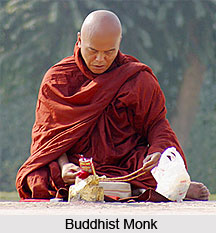 Punya, which means merit, is the concept in Buddhism. Punya is the primary attribute sought by Buddhists, both monks and laymen, in order to build up a better karma and thus to achieve a more favourable future rebirth.
Punya, which means merit, is the concept in Buddhism. Punya is the primary attribute sought by Buddhists, both monks and laymen, in order to build up a better karma and thus to achieve a more favourable future rebirth.
The merit or Punya contributes to a person`s growth towards liberation. In addition, one can "transfer" the merit of an act they have performed to a dead person in order to diminish the deceased`s suffering in their new existence.
There are three bases of Punya or merit. They are dana or giving, sila or virtue, bhavana or mental development. Buddhist monks earn merit through mindfulness, meditation, chanting and other rituals.
The disciples can make Punya or merit by performing seven acts. They are honoring others, offering service, being thankful for others` good deed, involving others in good deeds, listening to teachings, straightening ones own views in accord with the teachings and instructing others in the teachings.
Punya is also the name of a daughter of the sage Kratu, according to the Vayu Purana.
Again Punya is also the name of a river in Behar, now termed Punpun.
This article is a stub. You can enrich by adding more information to it. Send your Write Up to content@indianetzone.com




















